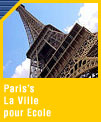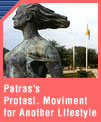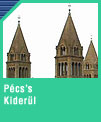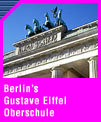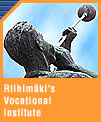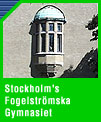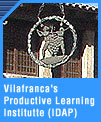|
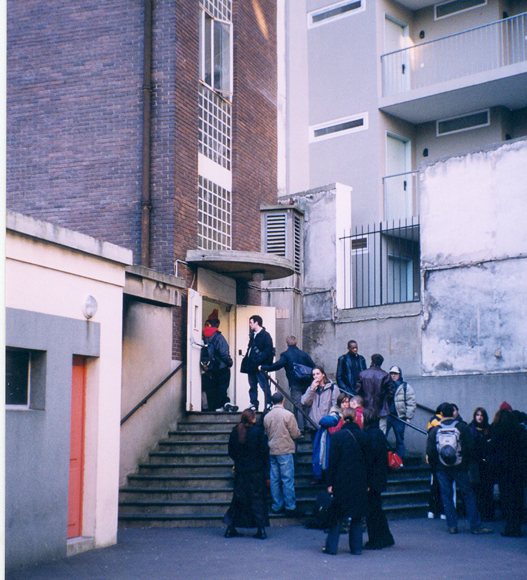 La Ville pour Ecole in Paris offers a new scholar system to students who dropped out of school, or who were looking for jobs, or were placed in classes they didn't choose. La Ville pour Ecole in Paris offers a new scholar system to students who dropped out of school, or who were looking for jobs, or were placed in classes they didn't choose.
Their participation to LVPE means a free choice, an investment, a way to become active in their career training. This new educational path is based on activities in the real world to discover and to tame it.
All the things that couldn't be learned at school can be learned during the orientation year.LVPE is based on this idea. During a one scholar year, each student completes internships in many different fields and non profit, cultural and sports fields.
LVPE welcomes students aged 16 to 20 years old. At school the students analyse their work experiences, complete his academic skills in French, English and maths (and some subjects according to their interests ).
They work as well on their personal career project, meaning the future plans for some students . In addition, they take part in different creative workshops ; theatre, video, writing .... and also in school At the end of the school year, sometimes during the year, students are integrated in some initial professional training or they begin secondary studies in Lyceé Intégral or other academic studies.
The aim is to define a personal project realistic and above all, chosen, and start on the way to reach these goals. (Since 1972, different City-as-School experiences have proven themselves. New York, Berlin and other european cities. They've shown their utility and effectiveness. These schools represent now a known INEPS model)
CITY ACTIVITIES
4 cycles, 5 to 6 weeks and 3 days per a week in internships : retail, child care, after school activities leaser, health care, art, graphics, video, computers ... 3 activities :
- to assist the professional
- to discover and to learn with the contact person, have some professional tasks.
- at the end to prepare a presentation on an aspect that they liked and to present it to the other students .
This experience offers:
- experience in a useful work
- to discover and to have precise information on work
- to explore possible futures.
The internship book is a document in which the student records all informations concerning his experience.
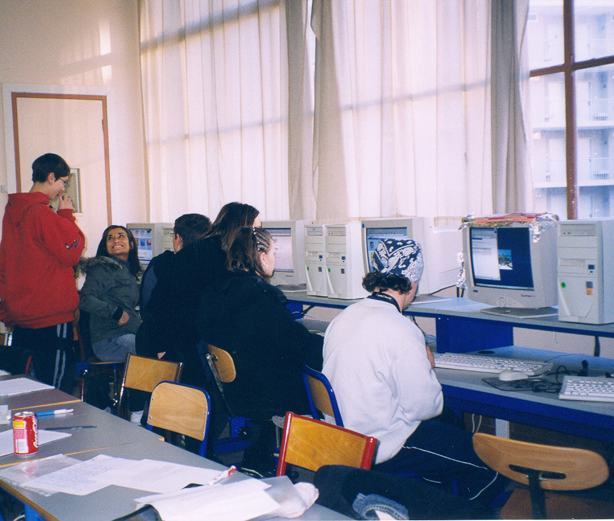
AT SCHOOL
-
Internships analysis
-
Once a week, students discuss on their week's experience at their internships places. They share. They work on interviews and their final presentation
-
career guidance / personal project It helps students to work on their professional projects. It organise meetings with professionals, guidance, exhibitions, school visits.
-
academic coursework
ASSESSMENT
- Internships : evaluation by the internship host final presentation, internship book.
- At school, the advisory council, twice a year with teachers, students and parents and some education professionals. Assessment of the work, progress and projects of the student. The school council, once a month, meeting with the students to talk, debate and to share about school life, organising activities and talking about problems, difficulties,...
OTHER PROGRAMMES
LE LYCÉE INTEGRAL
The "Lycée Intégral" welcomes young people who have dropped out of secondary education on account of failure, exclusion or an inability to cope with traditional methods of teaching, and who are willing to go back to school, with a view to obtaining a "baccalauréat" (A levels). After determining their objectives, the pupils are encouraged to resume an education consistent with national curriculum by working in small groups tailored to suit their specific needs. They are gradually reconciled with work, effort and autonomy, and acquire the self-confidence necessary to carry out and develop their own individual projects.
Who are our pupils?
They are between 16 and 20 years of age and have dropped out of secondary education. They are determined to try out a course of learning centred around their individual projects, and are helped and guided in this by their respective tutors and teachers. Pupils are also required to take an initiative and accept responsibilities, thus participating actively in school life.
Opportunities:
The aim of the "Lycée Intégral" is to reconcile students with a traditional course of education . Yet throughout the assessment process, pupils are asked to reflect on their objectives. This may lead them to question their former choices and to turn to courses that are more specifically geared towards industry.
ACTIVITIES OF VARIED FORM AND SPACE
A determining module:
A five-week programme during which pupils analyse, both in workshops and placements, their skills, their needs, and develop their projects after identifying their various shortcomings and difficulties.
School workshops that take on different forms:
- Thematic lessons where the subjects taught incorporate the pupils' projects and never fail to keep in touch with the reality of the outside world. In these work groups, they are helped by teachers and other young people to regain confidence in themselves and in school. Flupils finally overcome their difficulties and manage to make efforts, which had hitherto seemed impossible for them to achieve.
- Accompanied work: the homework (assignments and research work) is for the most part done at school with the help of teachers, and this, in a general atmosphere of collaboration and solidarity.
- Training workshop , where pupils are introduced to new technology and where they are encouraged to become more autonomous and responsible.
- Creative activities: photography, video, art, drama, graphic design all contribute to the personal, cultural, and social development of the pupils. These activities are a source of motivation and help them to acquire the skills and know-how, which will serve as a great asset for the elaboration of their projects.
- One should not forget the setting up of the Cafeteria, a place of exchange, conviviality and relaxation.
Trips and excursions:
Pupils have the possibility to travel to the countryside or to foreign countries. As well as giving them an experience of communal life, these trips help improve the pupils' linguistic and communication skills.
PERSONALIZED ASSESSMENT IN KEEPING WITH TRADITIONAL REQUIREMENTS
Tutoring:
Both the pupil and his or her tutor decide on a weekly work programme. The work done and the progress made are assessed on a regular basis, and the programme is constantly readjusted, according to the pupil's project and various deadlines
Advice meeting
take place at least once a term. Pupils and teachers analyse the pupil's results, the marks obtained, and the headway made in all areas and subjects. The learners are also guided in their choices and given advice as to which steps to follow.
The class council
meets twice a year and is presided over by the headmaster. In the presence of teachers, parents, and education specialists, each pupil presents his or her project, talks about his or her achievements and/or problems. The role of the council s to give advice, but at the end of the year they also have to take a decision the academic future of the pupil.
THE DIFFERENT MEMBERS
The education team
is composed of teachers, a school counsellor, 2 classroom assistants, a social worker, and is supervised by a coordinator and an administration attachée All the members of the team are voluntary and are in charge of teaching, tutoring, animation, and assessment tasks.
Resource persons
welcome pupils for placements during the determining module, a key period for them since important choices are made. These individuals play a vital in helping young people to regain their self-confidence outside the school. environment
Parents
have an essential role to play in guiding their children and helping them to determine their respective projects. They are urged to take part in the organisation and animation of communal life (cafeteria, outings, exhibitions ... ), and are welcome to participate in the class council or even in the lessons, should they wish to learn or teach particular skills. They may also act as resource persons or suggest new placement possibilities.
TERMS OF ENROLMENT
- interview with the headmaster of the Lycée Jean Lurçat.
- interview with a member of the education team . Written exercise aimed at assessing the pupil's abilities and his or her involvement in all aspects of the course (determining period, project building, assessment process, school life)
LYCÉE DE LA SOLIDARITÉ INTERNATIONALE
( International Solidarity School)
Voluntary registration with the Lycée de la Solidarité Internationale is a sign of a student’s determination to reconnect with school life through an educational project which demands both regular attendance at classes and an active participation in his/her personal learning plan.
Registration implies taking responsibility for internal collective activities and demands a behaviour pattern which is centred around respect for others and of group rules.
"The potential of a group is greater than the sum of the potential of each member".
This declaration provides the foundation for an educational approach which organises a student's life not only to allow the student to fulfil his/her own aspirations, but also to create a group dynamic which encourages a feeling of belonging.
The students
Students at the Lycée de la Solidarité Internationale are volunteers who, though they may not be faced with irremediable school problems, have encountered serious difficulties at school most often between the ages of 14 and 16. The Lycée de la Solidarité Internationale offers a programme over a period of two years, during which educational progress is assessed for students who had had a negative prognosis for year 11 and even, in the longer term, for year 12.
Recruitment
The Lycée de la Solidarité Internationale accepts volunteer students, after an initial interview with the teaching team.
Learning through action
Classes are organised around a mix of course work at the Lycée Jean Lurçat, work with humanitarian associations and the realisation of a field project connected with human rights (in the widest sense): health, education, development, culture etc.
Prospects
The aim of the Lycée de la Solidarité Internationale is to prepare its students for entry into a year 13 programme of their choice. The Lycée Jean Lurçat, a local state school, makes its own courses available: Economics and Social Sciences, Science and Technology, Lycée Intégral (aimed at re-motivating students at all levels who had more or less "dropped out"), Lycée du Temps choisi (organisation of timetable to suit specific student needs). The possibility of entry into the Paris Free School is currently being looked at.
Modular organisation
Concrete social action is the guiding principle underlying the course work. However, some 60% of time is devoted to the acquisition of the usual educational essentials. This split allows those students leaving the L.S.I. at the end of the first year to have a sufficient grasp of the basics of general education to move with ease into a higher Lycée class or into a professional training programme.
-
Educational module: Humanities / foreign language 1/ sciences/ social sciences (10 hours)
-
Specific training module: AFPS, TICE training (3 hours), 2 3-week work experience programmes plus one half-day per week.
-
Citizenship and development education module: collective management, creation of a project focused on solidarity and development education (5 hours).
-
Follow-up and career guidance module: tutoring, guidance, work experience follow up (variable)
-
Personal training module dependent on professional goals (8 hours): Help with personal work and self-discipline. Specific course work. Follow-up and preparation for specific training for careers in the development domain.
Evaluation
Evaluation is personalised, broad-based and connected with the student's personal learning plan.
Tutoring
The student creates and reviews his/her personal training plan, with the help of the tutor, to prepare the ground for his/her professional training plan. The tutor charts the student's progress in the various activities offered and follows up the work experience programme. The tutor is also the first point of contact for the students' legal guardians.
Work experience
The student has a work experience book, divided into two sections. The first section is reserved to the organisations (resource people) offering this opportunity, to set down their evaluation, and the second section is for the student to prepare his/her report, which will then be reviewed by the teachers and by the group.
Trainers for specific subjects.
Evaluation meeting
The student group and the teaching team meet three times a year to look at results obtained for all pedagogical activities.
Those involved
The teaching team: the team is made up of three permanent teachers and teachers from the Lycée Intégral who contribute in specific subject areas. The members of this team are all volunteers and carry out teaching duties, the organisation of activities, tutoring, supervision and evaluation.
"Resource people": members and organisers of voluntary associations, which offer work experience opportunities to the students and help the student create his/her training plan.
Outside trainers with specific technical or intellectual expertise in addition to that of the teaching team.
Parents: The teaching team attaches a great deal of importance to the involvement of parents in their child's educational project and the rekindling of interest in schoolwork. They are associated with their child's commitment to school right from the start and regular meetings are organised to inform them of progress, success or failure.
Registration requirements
- An interest in the world and a need to understand
- A wish to give time to others
- Have a year 11 or 12 educational level
- Be between 14 and 17 years of age.
|
